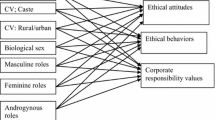Abstract
Ethics and associated values influence not only managerial behavior but also managerial success (England and Lee, 1973). Gender socialization theory hypothesizes gender differences in ethics variables whether or not individuals are full time employees; occupational socialization hypothesizes gender similarity in employees. The conflicting hypotheses were investigated using questionnaire responses from a sample of 308 individuals. Analysis of variance and hierarchical regression yielded unexpected results. Although no significant gender differences emerged in individuals lacking full time employment, significant differences existed between employed women and men, with women appearing “more ethical”. While occupational socialization predicts an interaction between employment status and gender, these group differences were opposite to those predicted. An implication for the two theories and the current conflicting research support is that these commonly used theories may be of limited usefulness. Some alternative concepts are proposed.
Similar content being viewed by others
References
Beutell, N. and O. C. Brenner: 1986, ‘Sex Differences in Work Values’, Journal of Vocational Behavior 28, 29–41.
Bussey, K. and B. Maughan: 1982, ‘Gender Differences in Moral Reasoning’, Journal of Personality and Social Psychology 42, 701–706.
Carroll, A. B.: 1978, ‘Linking Business Ethics to Behavior in Organizations’, SAM Advanced Management Journal 43, 4–11.
Eagly, A. H.: 1987, Sex Differences in Social Behavior: A Social-Role Interpretation (Erlbaum, New Jersey).
England, G. W. and R. Lee: 1973, ‘The Relationship Between Managerial Values and Managerial Success in the United States, Japan, India, and Australia’, Journal of Applied Psychology 74, 411–419.
Fiske, E. B.: 1990, ‘Lessons: Even at a Former Women's College, Male Students are Taken More Seriously, a Researcher Finds’, New York Times April 11, Living Arts Sec.
Froelich, K. S. and J. L. Kotte: 1991, ‘Measuring Individual Beliefs About Organizational Ethics’, Educational and Psychological Measurement 51, 377–383.
Gilligan, C.: 1982, In a Different Voice (Harvard University Press, Cambridge).
Gomez-Mejia, L.: 1983, ‘Sex Differences During Occupational Socialization’, Academy of Management Review 26, 492–499.
Gutek, B. A.: 1988, ‘Sex Segregation and Women at Work: A Selective Review’, Applied Psychology: An International Review 37, 103–120.
Harris, J.: 1990, ‘Ethical Values of Individuals at Different Levels in the Organizational Hierarchy of a Single Firm’, Journal of Business Ethics 9, 741–750.
Heim, P. and S. K. Golant: 1993, Hardball for Women: Winning at the Game of Business (NAL/Dutton, New York).
Kanter, R. M.: 1977, Men and Women of the Corporation (Basic Books, New York).
Lacy, W., J. Bokemeir and J. Shepard: 1983, ‘Job Attribute Preferences and Work Commitment of Men and Women in the United States’, Personnel Psychology 36, 315–329.
Lincoln, D. J., M. M. Pressley, and T. Little: 1982, ‘Ethical Beliefs and Personal Values of Top Level Executives’, Journal of Business Research 10, 475–487.
Manhardt, P.: 1972, ‘Job Orientation of Male and Female College Graduates in Business’, Personnel Psychology 25, 361–368.
Posner, B. and J. M. Munson: 1981, ‘Gender Differences in Managerial Values’, Psychological Reports 49, 867–881.
Ruegger, D. and E. King: 1992, ‘A Study of the Effect of Age and Gender upon Student Business Ethics’, Journal of Business Ethics 11, 179–186.
Walker, J., C. Tausky, and D. Oliver: 1982, ‘Men and Women at Work: Similarities and Differences in Work Values within Occupational Groupings’, Journal of Vocational Behavior 21, 17–36.
Author information
Authors and Affiliations
Additional information
E. Sharon Mason is an Assistant Professor of organizational behavior and human resource management in the Faculty of Business, Brock University, St Catharines, Ontario.
Peter E. Mudrack is an Assistant Professor in the Department of Management and Organization Sciences at Wayne State University, Detroit, Michigan.
Rights and permissions
About this article
Cite this article
Mason, E.S., Mudrack, P.E. Gender and ethical orientation: A test of gender and occupational socialization theories. J Bus Ethics 15, 599–604 (1996). https://doi.org/10.1007/BF00411793
Issue Date:
DOI: https://doi.org/10.1007/BF00411793




